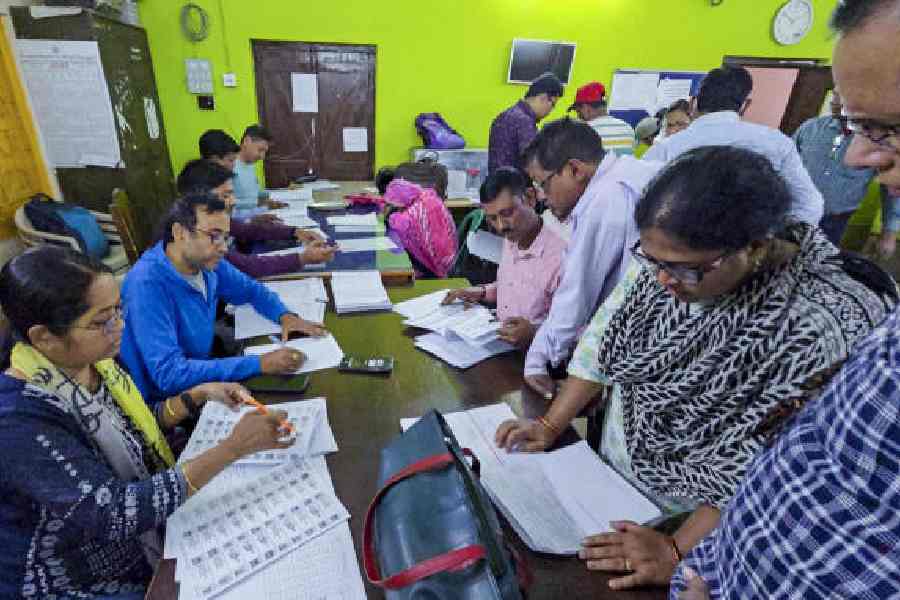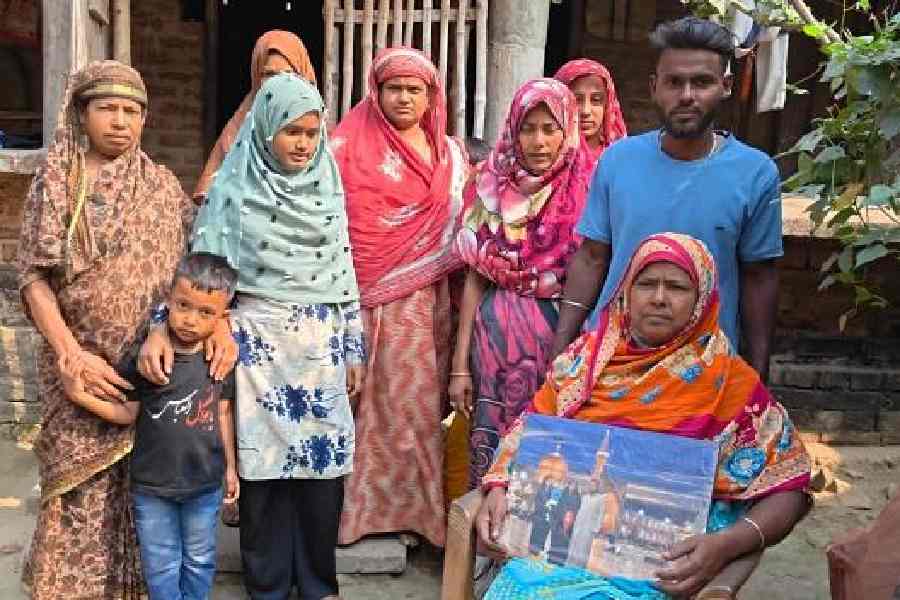
Almost 25 years after Jayvantiben Jitendra Trivedi died in a road accident in Gujarat, her work as a homemaker has got recognition.
The Supreme Court recently said a housewife's 'round-the-clock' work had to be taken into account when compensation was being awarded in a case of death. V. Gopala Gowda and R. Banumathi passed the judgment while hearing a motor vehicle accident claims case.
'Courts have recognised the contribution made by the wife to the house is invaluable and that it cannot be computed in terms of money,' the bench said. It raised the compensation to her family to over Rs 6.47 lakh from the Rs 2.09 lakh fixed by the Gujarat High Court earlier.
The high court had reduced the compensation amount of Rs 2.24 lakh - that the state motor accident claims tribunal had granted to the family - after the vehicle insurer argued that as a homemaker Jayvantiben would not have earned much in her lifetime.
The Supreme Court, however, said, 'Even assuming Jayvantiben was not self-employed... the fact remains that she was a housewife and a homemaker. It is hard to monetise the domestic work done by a house-mother.'
Senior Supreme Court lawyer Vrinda Grover feels this is an important judgment because it recognises domestic work as productive work. 'Why should a woman's work be judged in terms of the skill it brings to the market? A woman's role as a mother, a wife and a homemaker should in itself be considered productive work. You cannot always assign a monetary value to it but that does not make it non-productive,' she holds.
Grover points out that in 2010 the Supreme Court had slammed the 2001 census for categorising homemakers as 'non-workers' and equating them with 'beggars and prisoners' which it said betrayed 'a totally insensitive and callous approach... indicative of strong gender bias against women' and suggested that Parliament consider enacting a law to evaluate household work.
An apex court bench of Justices G.S. Singhvi and A.K. Ganguli, while hearing a petition in 2010 seeking compensation for the death of a housewife in an accident in Uttar Pradesh, expressed anguish that despite a clear constitutional mandate from Article 15(1) to eschew discrimination on grounds of sex, there was a distinct bias against women in its implementation and in social welfare legislation and judicial pronouncements.
'The time has come for Parliament to have a rethink on properly assessing the value of homemakers' and householders' work and suitably amending the provisions of the Motor Vehicles Act and other related laws for giving compensation when the victims are women and homemakers,' it said.
The judiciary, however, has not always been fair to homemakers. In Mali Devi vs Sukhbir Singh, 1997, the Delhi High Court assessed that a woman, who died in an accident in 1979, contributed Rs 150 every month by taking care of the family of six and helping her husband with farm work. In Jaimal Singh vs Paramjit Singh and others, 1998, the court fixed the contribution of a housewife, killed in an accident in 1997, at Rs 700 per month for cooking, cleaning, washing clothes, etc.
In 2001, in Lata Wadhwa vs State of Bihar, the Supreme Court fixed the compensation at Rs 3,000 per month for all homemakers between 34 and 59 years of age. For older women, the amount was Rs 1,600 a month. This judgment was cited in Captain Singh vs Oriental Insurance Co. Ltd and others, in 2004, by the Delhi High Court when it refused to award a higher compensation to the family of a homemaker killed in an accident, estimating the worth to Rs 10,000 per annum.
'The underestimation is at the level of undercounting her direct financial contribution and non-financial contribution to the family,' says Aasha Kapur Mehta, professor of economics, Indian Institute of Planning and Public Administration, New Delhi. 'This does not take cognisance of the massive impact that the loss of her life will have on the way her children will be nurtured and their future prospects. Nor does it take into account the effect on her husband or on the emotional impact on her parents and siblings and other relatives.'
The judgment, clearly, has wider ramifications. Why should a homemaker's contribution be recognised posthumously, asks Supreme Court lawyer Karuna Nundy. 'Why not recognise a housewife's services to her family and children when she is alive,' she says, adding that though it may not be always possible to value a woman's contribution in terms of money, she should have equal financial rights and power in a marriage.
Nundy, however, is not in agreement with the apex court's observation that it is difficult to monetise the domestic work done by a homemaker. 'I find the Supreme Court's views quite contradictory. On the one hand the court says that a homemaker's services are so invaluable that it cannot be monetised. On the other hand, it says her services to her family cannot be ignored while awarding compensation in cases of death. Therefore, on a purely jurisprudential basis, the apex court's judgment suffers from an Article 14 (equality before the law) infirmity,' she observes.
Feminist economists feel it is important to fix a monetary value on the contribution of a homemaker to the family and to the economy. But how do you compute her worth?
'There are several methods,' says Sanjukta Chaudhuri, associate professor of economics and women's studies, University of Wisconsin-Eau Claire, US. The 'market' method estimates the per hour market value of outsourcing each task accomplished by a homemaker; the 'opportunity cost' method is based on the prevailing average wage of people who are in the labour market with similar education levels.
'But I personally favour 'comparable worth' method', comparing the value produced by homemaking vis-à-vis occupations that are related,' she says.
Not everybody agrees with her. 'Though I feel a homemaker's contribution should be recognised, putting a monetary value on it will undermine the relationship between a husband and a wife. Moreover, it is quite insulting,' argues Anup Kumar Sinha, professor of economics, IIM, Calcutta.
Pradip Kumar Bose of the Centre for Studies in Social Sciences, Calcutta, believes that the concept of assigning a 'price tag' on housework violates the idea of a family. 'This idea has been debated in the US and UK but not found any favour because it is impractical,' the professor of sociology states.
In 2012, the then women and child development minister, Krishna Tirath, had proposed a bill making it mandatory for men to pay a salary to their wives for household chores. Though nothing came of it, it prompted feminists to demand the inclusion of homemakers' contribution to the country's gross domestic product. Chaudhuri points out that though major economies such as the US, China and India do not include homemakers' contribution in the GDP, some Latin American countries do so.
It will be a while before India moves in that direction.










